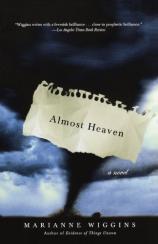Reading Group Guide
Discussion Questions
Almost Heaven

1. Who is on Holden's list of "the ten men who have shaped his life"? What does the fact that he keeps a list like this tell us about Holden's character? What is he looking for, what does he value, and what about his current situation compels him to return to this list, searching for "grace, trust, and humility"? Why is his own father not on the list? Is Noah John his surrogate father?
2. Sleep-deprived in the Frankfurt airport, traumatized by his experiences, and possibly in the midst of a nervous breakdown, Holden contends with his memory's "flashbulb effect." What is the "flashbulb effect"? What is Holden remembering?
3. While Holden is lost in memories of his grandfather, Padge, his plane to Richmond is struck by lightning with the abruptness and mystery of a symphonic explosion, "like Beethoven composing." At this point, before any of the central plot of the novel has unfolded, Wiggins has already established two central themes, memory and weather. What connections exist between the two? How do these early scenes foreshadow how the story will unfold and eventually climax?
4. Consider the stark, almost poetic nature of the fragmented phrases and words at the top of each page of the novel. How do they add to the tone and themes of Almost Heaven? Which ones strike you the most? Why?
5. At one point Holden reflects on the way his own voice sounds, describing it as "willful" and "strident." Would you agree? Although Wiggins writes Almost Heaven in the third person, it is a third-person narrative that is filtered thoroughly and solely through Holden's perspective, and his voice seeps through every line of the novel. What narrative techniques and idiomatic structures does the author employ to portray Holden's often flip personality and ragged state of mind?
6. Is Holden's decision to take Melanie out of the hospital -- ignoring Alex's advice and knowingly flirting with disaster -- a selfish one? Is it noble? Why? What exactly are his motives? Why is the pursuit of a love that grows out of the absence of history and memory, a love that is utterly without baggage, so appealing to someone like Holden?
7. Is it possible that Holden's drive to shelter and preserve a woman's innocence -- even a false and precarious innocence that hinges upon tragedy and amnesia -- might be a doomed attempt to find an antidote to his haunted memories of the war in Bosnia? Explain. What other things might be motivating his actions?
8. Why do you suppose Wiggins chose the name Holden Garfield, with its strong echo of Holden Caulfield, the iconic protector of lost innocence in Salinger's The Catcher in the Rye? How are these two characters alike?
9. What happens to Melanie and Holden after the novel ends? In your reading group, construct a hypothetical extra chapter.
10. What is the significance of the title? Reread the single-page chapter that begins with "Somewhere there's a monument to the love that you haven't found yet." Why isn't the novel simply called Heaven?
11. In a novel concerned chiefly with the nature of memory and loss in the 1990s, what is Wiggins doing by punctuating Holden's journey with a relentless string of Civil War monuments and museums? Toward the end of Almost Heaven, Holden finally recognizes the utter emptiness in Melanie's eyes -- "the Vacancy of meaning in a life whose history's been erased." At this point, what do we and Holden realize about the essence of the countless memorials that dot our landscape? Why is the presence of history, and of memory, so important?
12. In a powerhouse climax, Melanie's memory returns with the force of a tornado. Why is it so fitting that this happens -- Melanie recovers her own personal tragedy, just as Holden loses sight of his own personal heaven -- at the Jefferson Davis monument in Kentucky, the infamous site of The Lost Cause?
Almost Heaven
- Publication Date: December 1, 1999
- Paperback: 224 pages
- Publisher: Simon & Schuster
- ISBN-10: 0671038605
- ISBN-13: 9780671038601







